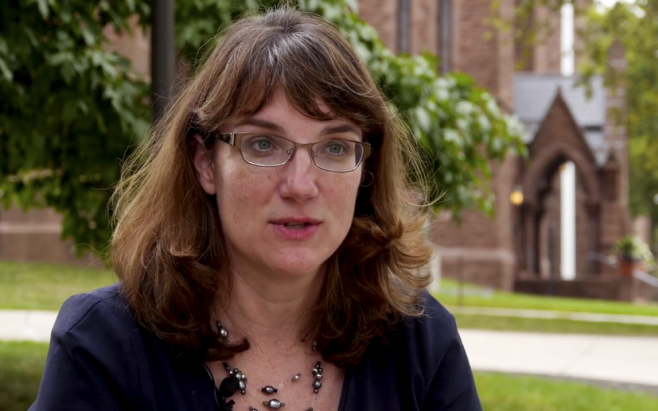
For many majors at the University, statistics is a must-take class. Countless fields require a basic understanding of statistics: biology and psychology, among others.
However, in Professor of Psychology Lisa Dierker’s eyes, statistics is more than just a requirement. In fact, she has designed a curriculum to prove just that: a program she calls passion-driven statistics.
“Many students view statistics as a requirement—an obstacle to be overcome on their journey,” reads the passion-driven statistics initiative website, created by Dierker. “Statistics are not an obstacle but rather a common language that will speed you along. You’ll need this language in order to understand what others are saying and to tell your story more forcefully and more authoritatively. It is the common language that unites all disciplines in the natural sciences and social sciences.”
Dierker is recognized as the Walter Crowell University Professor of Social Sciences. She has been teaching at the University for about 20 years, originally teaching applied data analysis classes but now focusing more on statistics and research methods classes.
When asked to describe passion-driven statistics, Dierker stated that the idea was an outgrowth of her own experiences as a student.
“I was a first-generation college student,” Dierker said. “And my first semester in college I didn’t know, ‘Did I belong there?’ or what my niche could possibly be. I had an English professor that responded to the verbal girl in me, thought I was good, and I ended up an English major. That really shows how someone thinking you’re good can totally change your path in life. And then also people thinking you’re not so good can also change your path in life. [For example,] my first semester, I took calculus, and my calculus teacher didn’t think I was anything special, so I became an English major. Passion-driven statistics came out of this experience where we are responded to in a particular way—as women, as underrepresented students, as first-generation college students, you know, as anyone who isn’t the sort of ‘straight down the middle’—and that can be limiting. It limited me. It made me believe certain things about myself.”
To combat these limitations for future generations, she developed the passion-driven statistics curriculum, which she hopes will provide a more warm and welcoming approach.
Dierker, along with Professor of the Practice in the Center for Pedagogical Innovation Jennifer Rose, who is also the Center’s Director, has been working to implement the program in high schools and colleges throughout the United States. Countless schools have already implemented the curriculum. However, Dierker and Rose plan to expand, disseminating the curriculum to schools across the country with the 2.8 million dollar grant recently received from the National Science Foundation.
But the passion-driven statistics curriculum is not only being implemented across the country. It’s here at the University, too.
“The project at Wesleyan known here as [QAC201] Applied Data Analysis was based on a collaboration among instructors in the QAC–Manolis Kaparakis, Rose, Valerie Nazzaro, previous post docs, et cetera,” Dierker explained.
Additionally, Dierker’s course, “Statistics: An Activity Based Approach” also builds upon this principle of statistics in service of research. Starting the first day, students are introduced to data sets and throughout the course of the semester develop and test their own research question, learning statistical tools as well SAS programming and research techniques along the way. At the end of the semester, students present their research at a poster session.
“Professor Dierker is very passionate about her work and engaged with the students and material,” Amy Schaap ’21 said, who took one of Dierker’s classes last year.
Dierker is very hopeful for the future of passion-driven statistics. Her main goal is to empower students, showing them that statistics is not an obstacle but a pathway to great things.
“One of the things I love about this class is I have students who will work with me for a semester, do a project, and at the end say, ‘I thought I wasn’t quantitative,’ and I’m thinking, ‘You’re 19, you don’t know what you are!’ So it’s that experience I really like,” Dierker explained. “The outcome of this project-based approach is the students feeling like their own heroes.”
Dierker and Rose’s project has received recognition beyond their grant. President Michael Roth ’78 praised their work on the Wesleyan blog last month.
“Their project, ‘A Data-Driven, Multidisciplinary Curriculum Providing Access to the Data Analytics Economy for Everyone,’ will improve STEM education while at the same time making it more accessible to different kinds of learners,” Roth wrote.
When asked whether she foresees any challenges with the grant, Dierker replied that the biggest challenge would not be with the students.
“The challenge is getting through to instructors.” she said.
She hopes to support instructors to feel confident enough to share this unique curriculum with their own students.
Hannah Docter-Loeb can be reached at hdocterloeb@wesleyan.edu.



Leave a Reply